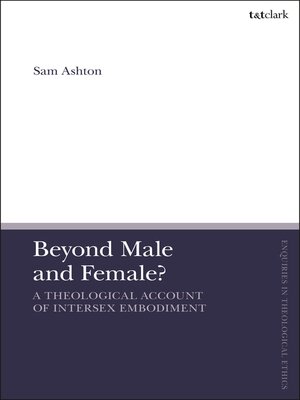Beyond Male and Female?
ebook ∣ A Theological Account of Intersex Embodiment · T&T Clark Enquiries in Theological Ethics
By Sam Ashton

Sign up to save your library
With an OverDrive account, you can save your favorite libraries for at-a-glance information about availability. Find out more about OverDrive accounts.
Find this title in Libby, the library reading app by OverDrive.



Search for a digital library with this title
Title found at these libraries:
| Library Name | Distance |
|---|---|
| Loading... |
In this incisive work, Sam Ashton provides a compelling, consistent and erudite argument for a foundational approach to the matter of sexual difference, drawing on biblical and doctrinal material and using resources in their original languages. He tracks and traces the sexed body as it moves from creation, through the fall, to redemption "now," and final consummation "not yet." In doing so, Ashton presents what is perhaps the strongest case that can be made for 'male and female He created them'.
Each chapter privileges biblical exegesis, drawing upon figures in church history (notably Augustine and Aquinas) as and when they illumine Scripture. By doing so, the book considers the difficulty presented to sexual dimorphism by the phenomenon of intersex. Ashton seeks to develop an understanding that is generous, inclusive and affirming, so he works carefully through the writings of Thatcher, Song and Cornwall in a way that invites engagement and dialogue.
With the complete divine drama in view, the book offers synthetic judgments about what remains essential for the "structure" of the sexed body as it travels through history and what may be accidental to the sexed body's "direction" within a particular theo-dramatic act. Ashton concludes by considering ways to transition from dogmatic judgments about intersexuality to the moral-pastoral care of concrete intersex individuals, briefly thinking about the complex matter of marriage.
Each chapter privileges biblical exegesis, drawing upon figures in church history (notably Augustine and Aquinas) as and when they illumine Scripture. By doing so, the book considers the difficulty presented to sexual dimorphism by the phenomenon of intersex. Ashton seeks to develop an understanding that is generous, inclusive and affirming, so he works carefully through the writings of Thatcher, Song and Cornwall in a way that invites engagement and dialogue.
With the complete divine drama in view, the book offers synthetic judgments about what remains essential for the "structure" of the sexed body as it travels through history and what may be accidental to the sexed body's "direction" within a particular theo-dramatic act. Ashton concludes by considering ways to transition from dogmatic judgments about intersexuality to the moral-pastoral care of concrete intersex individuals, briefly thinking about the complex matter of marriage.







